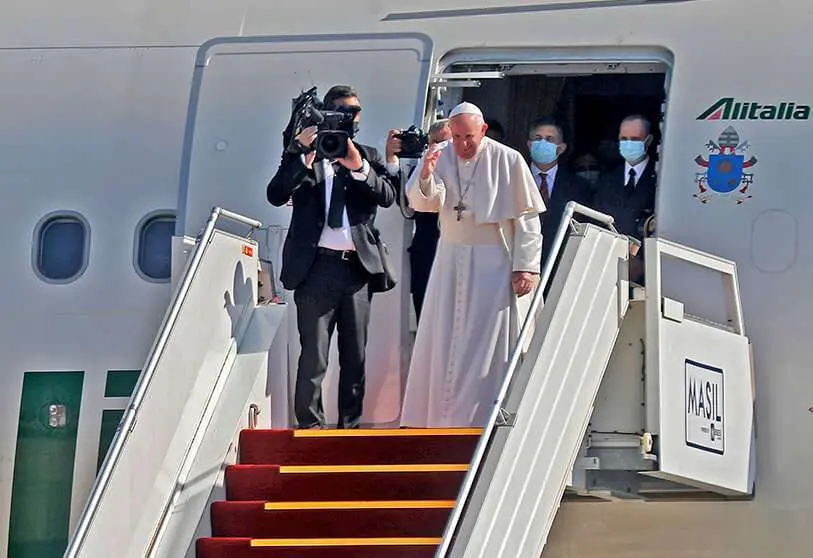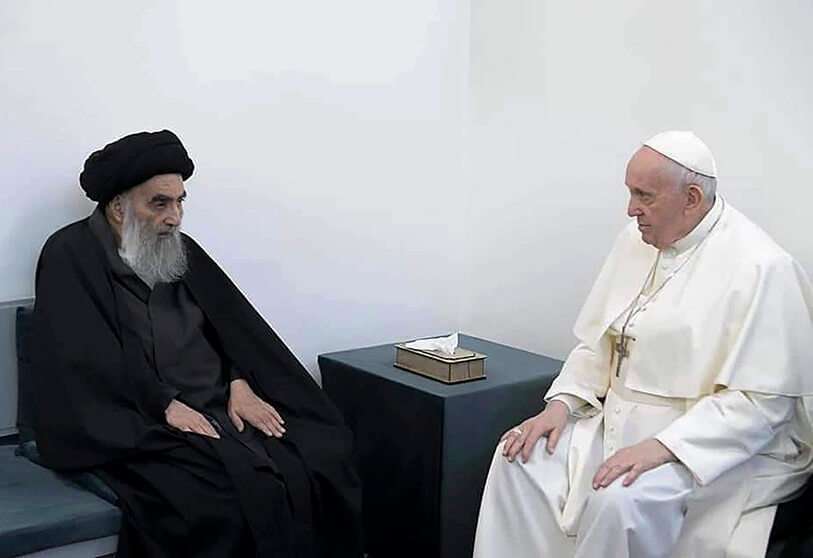Why is the Pope's visit to Iraq important?

Pope Francis bid farewell to Iraq today, after a three-day visit, with a mass in front of 10,000 people in Erbil, the capital of Kurdistan, after which he called for unity "for a future of peace" in the country.
"Iraq will always remain with me, in my heart. I ask all of you, dear brothers and sisters, to work together in unity for a future of peace and prosperity that does not discriminate or leave anyone behind," he said in his final message, which was interrupted several times by applause from the crowd.
Iraq is a country at a crossroads. Nearly two decades after the 2003 war, the country remains caught in a trap of fragility, facing increasing political instability, growing social unrest, religious factionalism and sectarian violence. Due to poor governance and widespread corruption, exacerbated by the COVID-19 pandemic, Iraq's economy is in dire straits. On top of that, the autonomous region of Iraqi Kurdistan, home to the Kurdish minority of 5 million inhabitants and a third of Iraq's total oil reserves, is openly vying for independence.

But in choosing to travel in the face of risks, to a country known primarily for its scars of war and suffering, the Argentine pope has once again brought together some of the ingredients that years earlier made his papacy a breath of fresh air for the Christian world. This trip comes at a time when other world figures are staying away, with the aim of contributing to the reconstruction of a country where decades of efforts have failed. His trip amounts to a show of encouragement to a nation trying to recover from the chaos of a US-led invasion and the brutality of Daesh.
This was the backdrop to Francis' apostolic journey: his first trip abroad after a 15-month gap due to the pandemic, and the first trip by a pope to Iraq. High hopes have been invested in the visit, with the general expectation that it will mark a turning point in national pacification and reconstruction. However, many seem to misunderstand what Francis can, and intends, to achieve.
The Pope's priority will be to ensure that the Christian presence in Iraq continues and recovers, so that the Church remains a recognised actor in Iraqi affairs. Francis wants to establish himself as a privileged political interlocutor with the Iraqi government and religious leaders. The Jesuit pontiff also aims to strategically position the Holy See as a major player in the crowded Middle East 'great game'.

Continued security concerns in a nation ravaged by years of war and conflict were also not enough to deter Pope Francis from fulfilling a promise to visit one of the world's oldest Christian communities.
Such a visit has been the dream of several popes. John Paul II had intended to go in 2000, but the trip was cancelled as tensions in the region rose. Benedict XVI was also invited, but was unable to go because of the war.
Some church officials believe that the Christian faith is in danger of disappearing from Iraq. Its ranks have been dwindling for years, down to about a third of the 1.5 million who lived there during the last years of Saddam Hussein's rule.
Iraq has welcomed the visit as an opportunity to showcase its relative stability after years of war and sectarian conflict. But it comes against a backdrop of continuing rocket attacks by Iranian-backed militias against US targets in Iraq, including an assault on Wednesday. It comes on top of a lingering Islamic State presence two years after the terrorist group lost the last territory it controlled there.

How could the Pope's rhetoric of "fraternity" alter the brutal reality for the country's Christians, whose population has dwindled from 1.3 million to 200,000 since the US-led invasion? Will the visit end up legitimising a political class that has failed to defend Christians from discrimination and jihadist persecution?
Iraqi President Barham Saleh said on Monday, as he bid farewell to Pope Francis on his departure from Baghdad, that his visit was a message of solidarity with the Arab country and his presence "a sign of peace and love" that "will remain immortal in the hearts of Iraqis".
"His comforting presence was a sign of peace and love that will remain immortal in the hearts of all sectors of the people, who yearn for security and peace," Saleh said in a message on his Twitter account alongside a photo of him seeing off the pontiff on the stairs of the plane at Baghdad airport.
Even the Archbishop of Erbil commented bluntly that the first papal trip to Iraq "was not going to help Christians either materially or directly, because we are really in a very corrupt political and economic system. There is no doubt about that. Pope Francis will hear fine words ... But when it comes to day-to-day issues, no, I don't think the story will change much".
On the other hand, Davide Bernocchi, Iraqi representative of Catholic Relief Services, told The Interpreter that as the fight against Islamic State has waned, a humanitarian disaster persists, with more than 1 million people still displaced. Falling oil prices have drained the government's coffers. And the coronavirus has only amplified the crushing economic problems.

"The fear is that this country has been forgotten" from the outside, Bernocchi said. "Because Daesh is no longer this military challenge. The arrival of the pope here is a great sign of respect, of course, from the leader of the Catholic Church, but also from a world figure who is drawing the world's attention to this country for a few days. It is an opportunity for this country to feel that they have not been forgotten".
Still, the Pope is going to Iraq not only to make reparations, but primarily to continue to build on the grand doctrinal and geopolitical design of his pontificate. Apostolic journeys are a key instrument for popes to unite public and classical diplomacy by mobilising Catholic masses and attracting non-Catholic individuals and elites, and then turning social kinetics into political influence, both domestically and internationally. For this reason, papal trips have a great impact on the political dynamics of the countries and the geopolitics of the regions where they occur.
At the same time, each papal trip is meant to serve as a stage for sending messages not only to the host nation, but also to the whole of humanity. Hosting a papal visit means that the world will be watching, as during the Pope's stay a nation is the centre of attention in the global media sphere and political discourse. As a result, the political and religious leaders of the host country are offered a unique opportunity to gain legitimacy and validation by meeting with the Pope, and even claim a legacy as peacemakers.
Often, papal trips precipitate historic turning points, as in the case of national reconciliation in Mozambique after Francis' 2019 visit, or spur major foreign policy moves such as the restoration of relations between Havana and Washington shortly before Francis' trip to Cuba and the United States in 2015.

With this mass the pope concluded his trip to Iraq, where he has held historic meetings, such as the meeting he had with Grand Ayatollah Ali al-Sistani, the highest religious authority of the Shiites, the visit to Ur of the Chaldees, where tradition has it that the prophet Abraham was born, and with Abdullak Kurdu, father of the little boy who was found drowned on a Turkish beach and became the symbol of the drama of the refugees, after the mass he celebrated in Erbil in the Franso Hiriri stadium during his visit to Iraq.
Middle East analyst Hayder al-Khoei told the Guardian: "The militants may not care much about international public opinion, but they do realise that the overwhelming majority of Iraqis, including the main Shia Islamist political parties and religious groups, are welcoming the visit. They like to present themselves as defenders of the faith and the country, but on this issue they are clearly out of sync".
Indeed, the pope's visit may already have helped the country's minorities. Last week, the Iraqi parliament finally passed a long-awaited bill offering reparations to Yazidis, Christians and others who survived Isis' kidnapping. It is widely suspected that the pope's visit prompted the passage of the new law.
Other effects are less immediate. The work of rebuilding Christian communities and literally rebuilding demolished churches will, at best, take many years. But Francis' visit, by affirming the presence of Iraq's Christians at this precarious time for the Middle East, will help the faithful to persevere. In short, for fragile and conflict-scarred countries like Iraq today, a papal visit can be a transformative event.









